Kao Releases Progress on ESG Strategy
Back to NewsKao Releases Progress Reports on its ESG Strategy, the Kirei Lifestyle Plan
Today (April 23, 2020), Kao Corporation, a Japan-based Group whose brand portfolio includes Bioré, Goldwell, Jergens, John Frieda and Molton Brown, released progress reports on its ESG (Environmental, Social and Governance) strategy, the Kirei Lifestyle Plan, which was first announced in April 2019. Details of its progress is released in the Kao Sustainability Data Book Kirei Lifestyle Plan Progress Report 2020 and, together with the Integrated Report, will be made available on Kao’s corporate website. The Release of English versions is planned for June.
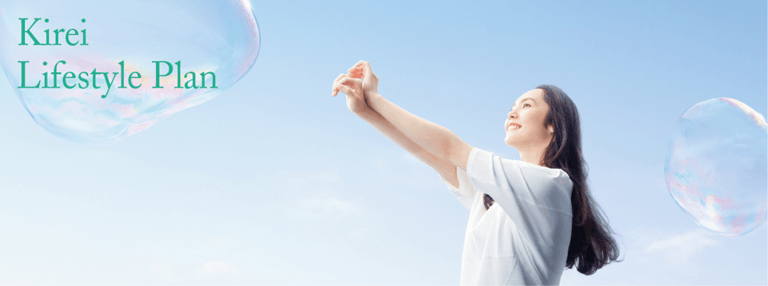
Kao’s ESG Vision (Short film)
In April 2019, Kao established its ESG strategy, the Kirei Lifestyle Plan, to realise what it calls the “Kirei Lifestyle,” a vision for a gentler and more sustainable way of living that consumers around the world are increasingly expressing a desire for. The Kirei Lifestyle Plan consists of three commitments supported by 19 leadership Kao Actions to deliver the Kirei Lifestyle vision by 2030.
Just one year into the Kirei Lifestyle Plan, the Report reveals that Kao Group has made a solid start towards achieving its 2030 commitments, with an impressive range of activities underway. Examples include the development of Bio IOS for the leadership action of Sustainable Lifestyle Promotion, the launch of MyKirei by KAO for Purpose-driven Brands, the development of Fine Fiber Technology and RNA Monitoring for Transformative Product Innovation, the use of renewable energy for Decarbonization, and the wide-scale start of in-store sales of the Smart Holder and the discontinued use of eye-catching plastic stickers on product packaging for Zero Waste.
Kao’s ESG efforts have been recognised and validated by several external bodies. Kao was included on the “A List,” the highest evaluation for climate change and water by CDP, a leading international NPO, based on a global survey of business enterprises’ response to climate change and their activities in relation to water security. In 2020, for the sixth year running, Kao was named to the Dow Jones Sustainability World Index (DJSI World), among the world’s most renowned socially responsible investment (SRI) indices. Kao was also selected for inclusion in the World’s Most Ethical Companies® 2020 list by U.S. think tank Ethisphere Institute. This marks the fourteenth consecutive year for inclusion on the list, an achievement that is a KPI for executive officer compensation at Kao.
On releasing the progress report on the Kirei Lifestyle Plan, Dave Muenz, Executive Officer in charge of Kao’s ESG Division, notes that: “To implement ESG-driven Yoki-Monozukuri, meaning implementing our Yoki-Monozukuri manufacturing with ESG perspectives, we discussed what activities were the most effective and uniquely suited to our company, and then shifted gears to execute them. We have set specific targets to work toward, including targets to reduce CO2 emissions that are approved and published by the Science Based Targets (SBT) initiative. As employee engagement is critical in implementing these activities, we are also focusing on internal education and dialogue with employees. We have welcomed two external experts to the External ESG Advisory Board established last year. This Board makes reports and suggestions in response to inquiries posed by the ESG Committee, and its external, global viewpoints inform our management activities. We will continue striving to realise business that contributes to living a beautiful life inside and out.”
Key leadership actions in the Kirei Lifestyle Plan
Leadership Action: Promotion of Sustainable Lifestyles
Kao enables people to live more sustainable lifestyles through information, services and products that save precious resources such as energy and water.
Progress: Kao commercialises breakthrough sustainable detergent base Bio IOS
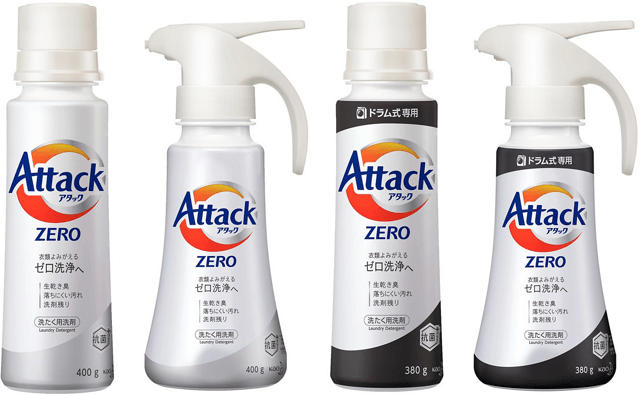
Bio IOS is made from the residue of the fruit of the oil palm collected and pressed to make edible oil. Palm oil is the most widely used multipurpose oil among all of the natural vegetable oil ingredients marketed in the world (190M tons/year in FY 2017). The solid fats obtained from residue left over from palm oil pressing have long carbon chains and have conventionally only been used for limited purposes. Bio IOS is a highly sustainable, next-generation detergent base due to its ability to effectively utilize fats that have been scarcely used in the past and its ability to extract oils from algae in the future. Bio IOS was first commercialised in Attack ZERO concentrated liquid laundry detergent, launched in Japan in 2019 as a sustainable laundry detergent.
The commercialisation of Bio IOS also supports the Kao leadership action: Responsible use of Raw Materials.
Leadership Action: Promotion of Sustainable Lifestyles
Every Kao brand will have a purpose that offers solutions to social issues within the communities or societies it touches.
Progress: Kao launches MyKirei by KAO, a Kao brand embodying the Kirei Lifestyle, in the United States
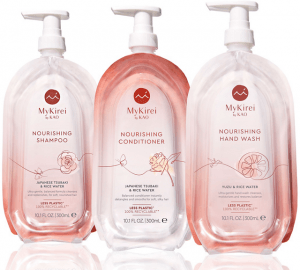
In April 2020, Kao began sales of MyKirei by KAO, a brand that embodies the Kirei Lifestyle, in the United States through its subsidiary Kao USA (photo from left: shampoo, conditioner, and hand wash, with refill packs available for each). With the start of this business in the United States, Kao will offer unique products using technology born from Kao’s essential research that have lighter environmental impact and are easy for everyone to use.
The brand’s packaging represents the first practical use of the Air in Film Bottle technology developed by Kao. The film is a flexible material used in refill packs such as Kao’s Raku-raku Eco Pack.*1 Inserting air on the outer layer of the film packaging expands the packaging so that it can stand on its own and be used as a bottle. This can reduce the use of plastic by approximately 50% compared with pump-type bottles. Kao offers a line of refill packs to encourage the repeated use of pumps. The Air in Film Bottle packaging also makes it easier to use up all of the liquid contents compared with traditional plastic bottles. Kao plans to offer a wider selection of products that allow consumers to participate in the Kirei Lifestyle.
* 1 Raku-raku Eco Pack: An original film-type packaging developed and promoted by Kao that is easier to refill and makes it easier to use up all of the liquid contents.
The launch of the brand also supports the Kao leadership action: Zero Waste
Leadership Action: Promotion of Sustainable Lifestyles
Kao pursues essential research to unleash breakthrough innovations that help realise more sustainable lifestyles by solving social issues and easing people’s pains.
The following two research and development outcomes are part of Kao’s social innovation to contribute to improved quality of life.
Progress: Fine Fiber Technology
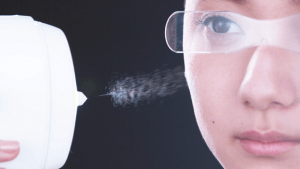
Kao established its Fine Fiber Technology in 2018, which creates a layered, ultra-thin membrane measuring less than 1 μm in diameter directly on the skin. The light, soft membrane moves flexibly with the skin and blends naturally without coming off easily. The membrane maintains adequate moisture permeability without completely blocking the skin and allows for the even application and retention of cosmetic products within the membrane. In 2019, Kao developed a high-performance diffuser to enable consumers to create the ultra-thin membrane at home, a beauty potion to create an ultra-thin veil when used with the diffuser, and a beauty essence. Kao launched these innovations as a two-step skincare product set offering intense hydration. The high-performance diffuser was developed jointly with the Appliances Company of Panasonic Corporation, which has beauty appliance technologies. Going forward, Kao will use this Fine Fiber Technology to develop base makeup products that provide coverage for pores, uneven colouration, spots and other skin concerns. Kao also aims to develop uses for the technology that brings new value to the medical field, such as aftercare for laser therapy and care for skin disorders resulting from injuries.
Progress: RNA Monitoring
In 2019, Kao announced that it had collected data on approximately 10,000 types of RNA expression from human sebum and developed original RNA Monitoring technology to comprehensively analyze the data. Analysing DNA is effective for understanding the attributes a person is born with, while analysing RNA enables insights into day-to-day changes in conditions caused by the environment and other factors. Using RNA obtained from sebum, this technology can also detect characteristic changes in people with atopic dermatitis. Skin problems are a social issue connected to lower quality of life. Kao also announced a collaborative project with Preferred Networks, Inc., which is now underway to understand individual customers’ skin conditions by combining AI technology such as machine learning and deep learning with big data on RNA that factors in individual differences. Kao anticipates being able to achieve healthier skin and improved quality of life by providing optimized skin care methods through RNA Monitoring and is proceeding with research and development.

Further application and expansion of the two technologies will also support the Kao leadership action: Improved Quality of Life.
Leadership Action: Decarbonization
Kao contributes to global decarbonisation by reducing the full lifecycle CO₂ emissions of products to a level that aligns with a 2℃ (or lower if possible) global warming scenario.
Progress: Kao contributes to global decarbonization
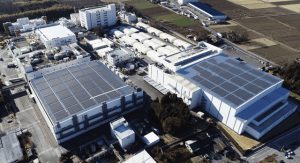
Through its commitment to a 2 degree Science-Based Target for carbon reduction and purchasing 100% renewable energy, Kao is proactively taking steps to reduce its greenhouse gas (GHG) emissions. Kao has set the 2030 target*2 of reducing GHG emissions at all of its worksites by 22% (compared with 2017). It has installed captive solar photovoltaic power generation systems and increased the use of renewable energy among its purchased power.
In 2019, new solar systems were installed at the Tochigi Plant and the Toyohashi Plant. In the 12 months of 2019, Kao Chemicals GmbH (Germany), Kao Manufacturing Germany GmbH and the three locations of Kao Corporation S.A. (Spain), and Kao Chimigraf, Molton Brown, Kao USA, Kao Sanitary Products Ehime and Kao’s Kawasaki Plant switched all of their purchased power to renewable energy. Kao has set the target of purchasing renewable energy for 100% of its purchased power by 2025 in Japan and by 2030 group-wide. Use of renewable energy has reduced Kao’s CO2 emissions by 95,000 tons.
* 2 This target has been approved by the Science Based Targets initiative.
Leadership Action: Zero Waste
Kao helps drive the transition to a circular economy by optimizing material selection and minimizing their use, recycling all waste, and making packaging practically reusable and recyclable.
As part of its Innovation in Reduction action to create circularity of plastics, Kao has implemented the following two initiatives. Kao is also continuing to improve upon its ongoing activities to make packaging thinner, promote the use of refill packs, make products more concentrated and sell products in larger quantities.
Progress: Kao sparks wide-sale in-store sales of the Smart Holder in Japan
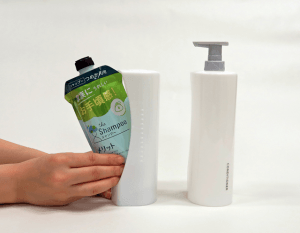
Starting April 2020, in a bid to move away from rigid plastic bottles, Kao has expanded in-store sales in Japan of the Smart Holder, which, in combination with film-type refill packs for shampoo and conditioner, can be repeatedly used without refilling. In 2016, Kao launched sales of refill products using the Raku-raku Eco Pack for highly viscous products such as shampoos, conditioners and body washes. The Raku-raku Eco Pack is made of film, which enables an approximately 80% reduction in plastic use compared with the primary package, and a 3% reduction in CO2 emissions from manufacture through to use and disposal compared to previous refills. The Smart Holder has mainly been sold online since its launch in 2017, but now with the start of wide-scale sales in stores, it will be more accessible to more consumers, and its convenience is expected to give an added boost to the use of eco-friendly Raku-raku Eco Pack refill products.
Progress: Discontinuing use of eye-catching plastic stickers
In stages, Kao is discontinuing the use of eye-catching plastic stickers, which are attached to product packaging to attract consumers’ attention, for its Bioré u body washes (some products excluded), body care products and bath additives launched in spring 2020. Eye-catching plastic stickers have the advantage of communicating targeted information such as the product features and usage instructions to consumers at the time of purchase, but they increase plastic consumption, adding to plastic waste and higher CO2 emissions during disposal. Now, Kao will display the content that used to be communicated on the stickers on the product package itself. When information, such as usage instructions, must be communicated going forward, Kao will switch to using FSC-certified and other certified recycled paper and switch to other communication methods to discontinue all use of the eye-catching plastic stickers by the end of 2021.

These two initiatives also support the Kao leadership action: Decarbonization
By bringing an ESG perspective into business strategy and management, the Kao Group aims to drive business expansion through innovative products and services that better meet changing needs of consumers and wider society.
Kirei Lifestyle Plan
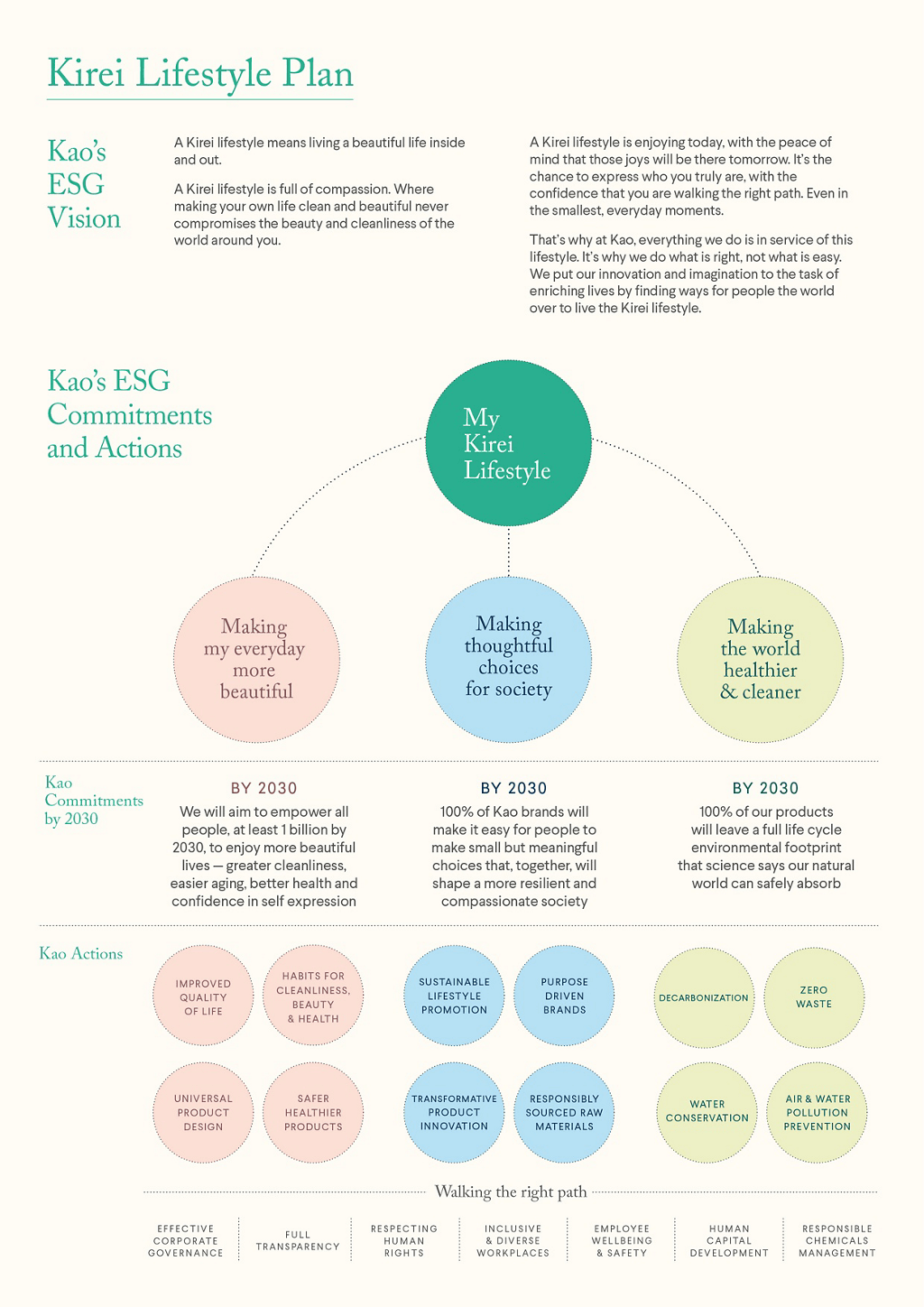
About the Kirei Lifestyle Plan
Over the past 130 years, Kao has worked to improve people’s lives and help consumers realize fulfilling lifestyles. Kao began the four-year Kao Group Mid-term Plan K20 in 2017. While increasing its focus even more on the ESG-driven activities that it has been conducting to realize sustainable business growth and sustainability for society, Kao is also striving to realize profitable growth. In 2018, Kao released “Our Philosophy and Action on Plastic Packaging,” which presents its set of approaches to the social issue of plastic packaging. Building on this activity, Kao created its ESG strategy, the Kirei Lifestyle Plan in April 2019.
About Kao
Kao creates high-value-added products that enrich the lives of consumers around the world. Through its portfolio of over 20 leading brands such as Attack, Bioré, Goldwell, Jergens, John Frieda, Kanebo, Laurier, Merries and Molton Brown, Kao is part of the everyday lives of people in Asia, Oceania, North America and Europe. Combined with its chemical division, which contributes to a wide range of industries, Kao generates about 1,500 billion yen in annual sales. Kao employs about 33,000 people worldwide and has 130 years of history in innovation.